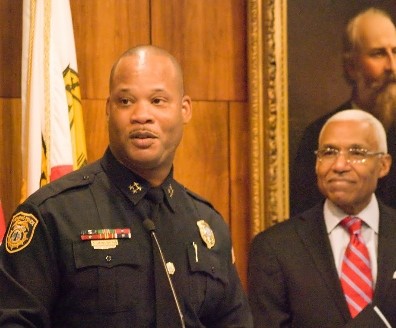Memphis police director Toney Armstrong won Round One in budget negotiations with the city council, where he found support for a 4.6 percent raise for employees.

Armstrong was the main event in a morning of budget hearings Tuesday. A majority of budget committee members voted in favor of his proposed budget, which includes the pay increase for 2,348 police department employees. Mayor A C Wharton has proposed a 2.3 percent increase. The final budget decisions are still a few weeks away, but the committee’s budget cutters — Jim Strickland, Shea Flinn, and Harold Collins — were outvoted roughly two to one.
Chief administrative officer George Little shook his head after the vote was tallied.
“It doesn’t add up,” he said. “We either have to raise taxes or go back to employees and cut raises.”
He called Wharton’s proposed 2.3 percent raise “affordable.”
Armstrong said the budget he presented “didn’t have any fluff,” and 87 percent of it “is for personnel and keeping boots on the ground.”
Sixty cents of every dollar the city administration spends is for public safety, and three out of every four general fund employees work in police or fire divisions. The proposed fiscal year 2014 budget is $622.5 million.
Strickland and Flinn said a 4.6 percent raise (restoring a cut made in 2012) would increase the property tax rate from $3.39 to $3.51.
“We are about to tax our city out of existence,” Flinn said.
Strickland questioned whether police officers have to take a “full service” approach and respond to every car wreck, house alarm, or barking-dog complaint. But Councilman Joe Brown countered that “we never know what is on the other end” of such calls, and “process servers or rent-a-cops can’t handle it.”
Other council members suggested chipping away at details of the police budget such as lawsuits, helicopters, and guns and ammo, but Armstrong gave up no ground. The lawsuits, he said, stem mainly from traffic accidents, and the department has to maintain the four aging choppers it has because a new one would cost about $3 million. The cost of weapons and ammo has been driven up by war, he said.
The director, 46 years old and a 24-year veteran, also threw retirement decisions into the mix. Officers with similar experience, he suggested, might decide to stay or go based on the 4.6 percent pay increase, and that would have a trickle-down effect on staffing and experience throughout the force. Several times he used the phrase “need to be proactive” to parry suggested cutbacks.
Bottom line: Round One to Armstrong.
Earlier in the committee meeting, Linn Sitler of the Film and Television Commission broke a little minor news. A BET production crew has been filming episodes of the reality television program Judge Mathis in Memphis for several months. Greg Mathis is a retired judge from Detroit whose courtroom program has run for 14 years.
“They didn’t even want a kickoff,” Sitler said of the low-key project.
The new episodes apparently will depart from that formula by having homicide detectives investigate cold cases and work the streets instead of featuring Mathis dispatching cases in a courtroom. Mathis will seek help from the Memphis community to, in Armstrong’s words, “bring closure to the families.”
Armstrong, himself a former star of another reality cops program, The First 48, in his pre-director days, said producers contacted him and Mayor Wharton last year.
“They reached out to us and asked for a meeting,” he said, adding, “I won’t be featured.” Instead, the stars will be “seasoned veterans” from the homicide division who “know their way around an investigation and a camera.”
Sitler, who sailed through her hearing unscathed in a couple of minutes, said the success of the television series Nashville might loosen the purse strings in state government for doling out incentives for film and television projects in other parts of the state.
With bigger fish to fry, Little seemed less exuberant and said he had only attended one meeting about Judge Mathis.
“We’re open to it,” he said. “It’s better than Memphis being filmed in Georgia,” an apparent reference to TNT’s since-canceled Memphis Beat, which was filmed in New Orleans.